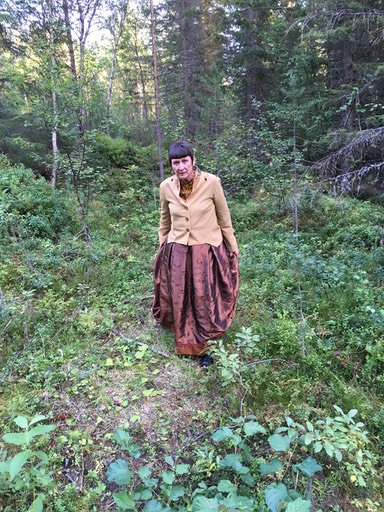
I’m an American writer living on a Norwegian seacoast island with my artist wife. We call our house “Haven” which means “garden" in Norwegian and of course in English it means it’s our refuge. My writing hermitage is a pine paneled room on the third floor.
I have lived in Norway since 2001, arriving on a trajectory that began in the American Midwest, crossed through Hawaii before landing me in the Norwegian Arctic, in a seacoast town, a house overlooking a fjord and mountains that stretched all the way to Sweden. For nearly two decades the stark arctic climate and landscape nourished me. When I no longer needed it, when I needed to move inward, I came to Askøy, Ash Island. Our house nestles between a rock face cliff and forest, overlooking a meadow. Nearby are craggy low mountains, marshland and moors. It is remote and quiet, but only a half hour away from Bergen by electric car. The best of rural and urban living.
My life as a poet began when I watched my mother take up a pen and write—for me—a poem as if pulling it out of the empty air.
Oh little pussy-willow
I have so often thought,
You’d make a lovely pillow
All kitty gray and soft.
And if I were the proper size
Perhaps an inch in height,
I’d put you in my tiny bed
To hold my head at night.
I thought I had witnessed an act of creation no less wondrous than if she had pulled a pony out of the breadbox. Later she introduced me to an old tattered textbook volume containing Archibald MacLeish’s iconic Ars Poetica of which the first and last couplets are emblazoned on my memory:
A poem should be palpable and mute
As a globed fruit…
A poem should not mean
But be
And then there was Eliot. I must confess that I sat through many of my English lectures in college with an aching head. Not a headache, but a head so full of indistinguishable thoughts it was straining to burst. Little of what my professors said made sense. With each class I felt I knew less than when I started. I was ony sixteen. I had dazzled my high school principal into agreeing to let me graduate early, but now I knew I was smart in everyone’s eyes but my own. Why they kept giving me good grades was beyond me. I sat in the Eliot symposium feeling like a fraud.
One day, long after college was over, I sat in a small apartment, my quilt wrapped around me (I recall the slant of light, the time of day, the patchwork on the quilt...I can return there like Wordsworth to his daffodils). I randomly picked up my college poetry textbook to read. My notes were scribbled in the margin (like the good student I had appeared to be, I took notes). I read “The Love Song of J. Alfred Prufrock” and this time—because I read slowly, or because there was no pressure from a professor to try to understand it—I felt transported, literally lifted outside space and time inside the room's bright, shimmering light. I felt like Saul on the road to Damascus, scales falling from my eyes, showing me that I had been blind, but oh, now, I could see. So this was poetry. After that encounter I began to write. Other early influences on my writing were Blake, Plath and an Iowan named Paul Zimmer. For about ten years I workshopped poems weekly with poets Alison Townsend, Judith Strasser, Sue Wicks, Susan Elbe, Robin Chapman and Jesse Lee Kercheval. My tribute to our writing group was published in a book on forming a writing group.
I turned to creative non-fiction after attending a fiction conference where the late, great Michael Steinberg founder of Fourth Genre, talked about creative non-fiction, a new genre combining the intimate, emotional proximity of poetry with prose's sense of galloping through a wide open field. I tried it on a failed poem about my mother and— Eureka! Fourth Genre published my first essay.
Then my writing journey fell stagnant. I felt a restlessness I named “needing to break through to my creative power,” which sounded so cliche I told no one I was suffering. Finally, though, I reached a point so low point the bottom broke through. Yes, a breakthrough. I communicated with an Indian foremother, my father’s maternal grandmother whom I called Ammaji. Her simple advice to my wish for breaking through to my creative power is a lesson I relearn daily, for writing in the end is simply a practice.
Write for joy.
Write for the necessity of joy and the joy of necessity.
Everything else will fall into place.
If you focus on process you will produce.
If you focus on product you restrict yourself again and again.